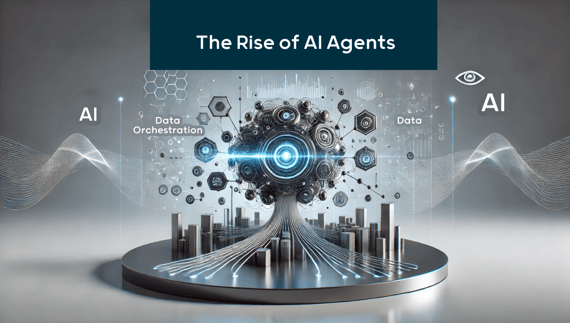The workplace is quickly changing as more organizations adopt AI-powered solutions. Microsoft 365 Copilot and AI agents are transforming how we work by automating tasks, improving workflows, and even supporting decision-making. However, a major challenge remains: data. Without a solid data strategy, these intelligent assistants cannot operate effectively. This is where data orchestration becomes crucial, playing a vital role in the success of AI-driven workplaces.

From Copilots to Autonomous Agents
AI assistants in the workplace exist on a spectrum. On one end, we have Copilots—AI-powered tools that assist users with specific tasks, providing recommendations and automating simple processes. They enhance productivity but still require user interaction to function. On the other end, we have autonomous agents—AI systems that operate independently, making decisions, executing workflows, and acting on behalf of users with minimal intervention.
While the potential of AI agents is enormous, their effectiveness depends entirely on the availability and quality of structured, reliable, and accessible data. AI cannot generate meaningful insights or automate processes if it lacks access to accurate and relevant information.
The Role of Data Orchestration in AI Success
Data orchestration refers to the process of unifying, organizing, and optimizing data from multiple sources to ensure AI systems operate efficiently. For organizations implementing AI solutions like Microsoft 365 Copilot or AI agents, this means addressing several key challenges:
- Breaking Down Data Silos: Enterprise data is often scattered across various platforms—SharePoint, OpenText, file shares, CRM systems, and custom databases. Without integration, AI lacks a complete view of the information it needs.
- Ensuring Data Security & Governance: AI adoption introduces new risks, making it crucial to establish access control, compliance measures, and data usage policies to prevent unauthorized exposure.
- Improving Data Quality: AI agents are only as good as the data they process. Inconsistent, outdated, or incorrect information leads to poor decision-making and a lack of trust in AI recommendations.
- Selecting the Right Data for the Right Use Case: Not all high-quality data is useful for AI. Different AI solutions and use cases require tailored datasets to ensure relevance and accuracy. By structuring datasets per AI application, organizations can improve efficiency and ensure optimal AI performance.
A New Role in the AI Era: The Data Orchestrator
As AI agents become more sophisticated, organizations need a new role or function dedicated to managing AI datasets. This Data Orchestrator ensures AI solutions have continuous access to the right information, maintaining high data quality and security. Their responsibilities include:
- Curating AI-Ready Data: Selecting, cleaning, and structuring data to be used in AI models.
- Managing Integrations: Connecting various data sources to AI systems, ensuring a seamless flow of information.
- Ensuring Governance & Compliance: Defining and enforcing data security policies to protect sensitive information.
- Optimizing AI Performance: Reducing redundant queries and ensuring efficient data processing to improve response times and reduce energy consumption.
The Future of AI Lies in Data Orchestration
As organizations move beyond simple AI assistance toward fully autonomous agents, the importance of data orchestration will only grow. The ability to unify, prepare, and govern AI datasets will determine the success of AI initiatives in the workplace. The future isn’t just about AI—it’s about how well we manage the data that fuels it.
Are you ready to optimize your AI data strategy? Let’s discuss how we can help you lay the foundation for a truly AI-powered workplace.
No Comments Yet
Let us know what you think